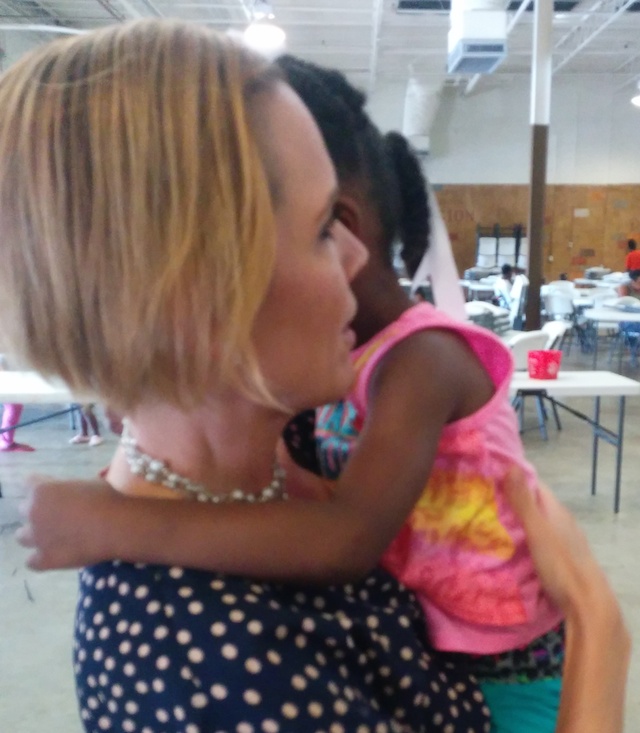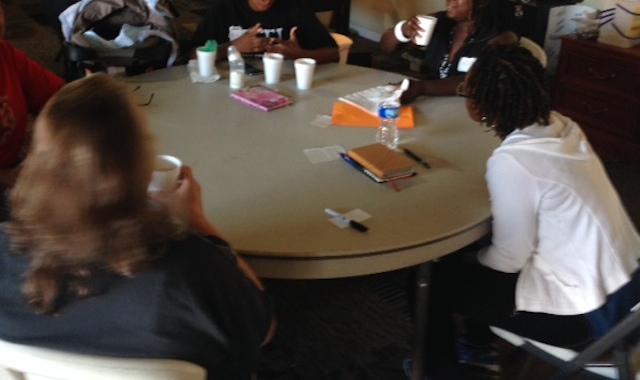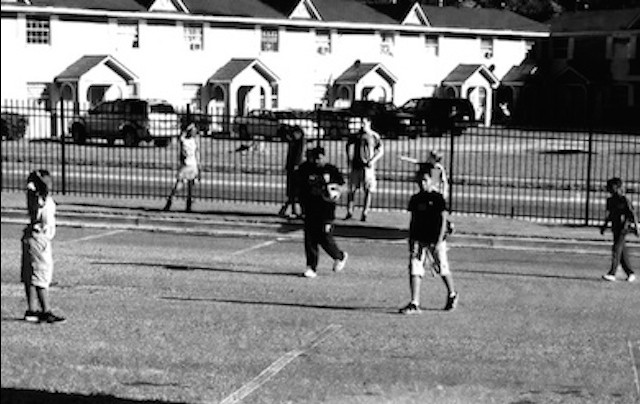by Kimberly Sawatka | Nov 4, 2014
Over the past year, Georgia Center for Opportunity has hosted a series of luncheons aimed at encouraging local educators and business leaders to think outside of the traditional education reform box. Past keynote speakers have shared ways educators can work within their schools to become “cage-busting” leaders, and how business professionals can form coalitions to support quality education.

In this same vein, GCO recently had the pleasure to host Sajan George, the founder and CEO of Matchbook Learning. Sajan not only introduced the unique Matchbook blended-learning model, but he also shared ways his “turnaround” methodology can be applied to even the most underperforming schools in Georgia.
What is different about Matchbook Learning?
For students at a Matchbook school, grades are virtually irrelevant. Instead, the emphasis is placed on instructional levels of learning. Rather than go through curriculums associated with the grade they are in (i.e., 3rd grade), students begin lessons based on their skill level, which may be higher or lower than the actual grade they are in (e.g., they may be at a 1st or 4th grade level). Students advance from their individual starting points based on their ability to master a skill at a pace that is independent of other students’ progress in the classroom. This concept is commonly referred to as competency-based education.
By using online learning platforms, Matchbook Learning has created a revolutionary learning system that does not just treat the symptoms of failing schools, but addresses the root cause of failure. Far too often schools focus on one-size-fits all instruction and traditional seat-time to improve student outcomes. However, what is truly needed is the ability to customize learning paths to meet students where they are. This system has already proven its ability to propel struggling students to new heights academically by not overwhelming them with instruction far beyond their ability and by allowing them to progress at their own pace.
What is special about Matchbook Learning is that is does not just give struggling students the autonomy to work independently, it also frees up teachers to work with students on a more engaged level. Through the online platform, teachers always know where their students are in their learning and can arrange their classes with ease to provide more help to students who need it.
Matchbook has already scaled turnaround success in classrooms, schools, and school systems in places like Detroit, MI and Newark, NJ.

Can the Matchbook model turnaround Georgia?
To apply these turnaround methods in Georgia, Sajan noted that a more innovative vision of education is needed across the state. One possible starting point, however, could be Gov. Deal’s proposed recovery schools districts. Looking to the Matchbook Learning system as a best practice for these would-be state charter schools could provide the much needed guidance to transform low-performing schools into student-centered learning environments.
Through collaboration with innovators such as Sajan George, Georgia Center for Opportunity continues to remove barriers to quality education by promoting solutions that have been proven to work. Considering models like that of Matchbook Learning are a much needed step in the right direction for giving Georgia a real chance to prosper.
by Kimberly Sawatka | Oct 10, 2014

Walking into a polling booth and thinking, “Who is this guy??” could be the scariest thing you do this fall. With major state and national seats on the line, thoroughly researching candidates and their platform is a vital first step in selecting effective leadership this November. As Midterm Elections are almost upon us, now is the time to get to know the people who will potentially represent you, your family, and your community.
Why be an informed voter?
For starters, unaware citizens make for a good laugh on Jimmy Kimmel skits. Seriously though, ill informed voters do little to change the conversation on topics that matter the most in local communities. For education, in particular, the upcoming election–by way of the Governor’s and State School Superintendent race–will determine who rolls out new reform strategies to improve outcomes for students across the state. Likewise, Georgia’s US Senate race will have a tremendous impact on which party controls the House and Senate.
Investigating beyond sponsored television ads and news clippings can boost the power of your vote this election day.
3 Ways to Get to Know Midterm Election Candidates
- Visit candidate websites: Starting with a visit to candidates’ campaign website is a quick and easy way to familiarize oneself with the respective platforms. Creating a checklist of issues that matter to you will expedite the process of comparing and prioritizing candidates according to their stance.
- Check voting records: Beyond what candidates say, it is important to research how they support the issues you care about. Particularly for incumbents, checking sites such as Govtrack.us will clarify candidates’ legislative voting record. Additionally, it may be beneficial to search for initiatives that candidates are leading independently.
- Attend local debates/community events: Engaging political hopefuls directly and in-person is an invaluable opportunity for informed voters. If possible, make it a priority attend community events where candidates will be in attendance. Also, be sure to attend or watch upcoming debates.
Whether turningout for issues impacting local communities, the state, or the nation, taking the time to know the candidates and where they stand is the responsibility of each voter. With the use of the tips above, make your vote count on November 4th.
by Kimberly Sawatka | Sep 12, 2014
Meeting people “where they are” is foundational to Georgia Center for Opportunity’s (GCO) mission to serve the community and remove barriers to opportunity. As part of this mission, GCO team members recently participated in a unique weekend retreat at City of Refuge (COR), one of Atlanta’s largest homeless shelters for women and children. While this experience was an excellent platform for team bonding, the team also gained life-changing lessons from the residents of COR.
DAY 1

Linda Newton holds new friend at City of Refuge. Courtesy, @GAOpportunity
While many programs provide meals and clothing to the homeless, very few provide the opportunity to connect deeply with those being served. GCO’s retreat was graciously hosted by one such organization, Restoration ATL (RATL), a non-profit dedicated to creating urban ministry environments that foster healing. RATL’s director and weekend guide, Pastor Jim Ellison, emphasized with great passion that volunteers were there to simply “be with” the ladies and children to get to know them better.
Assimilating into life at the shelter was eased immediately by the children. Delivery Manager, Linda Newton, reflects on her initial moments at COR:
My first experience that weekend was with a 3-year old girl. She blind-sided me, running up to me from behind and immediately holding her arms up to me as if we were long-lost friends. I picked her up and she wrapped her arms and legs around me tight. She was absolutely a love, and we became fast friends.
As the children ushered in the team, dinner time provided opportunities to learn about the women of COR and the circumstances that led them to the shelter. While some women were more open than others, the stories and fellowship that flowed across the dinner table further broke the ice between volunteers and residents.
I had the pleasure of eating dinner with a woman named Liz. She shared with me that a house fire displaced her months earlier. This is a situation that could impact anyone! Throughout our encounter, Liz expressed great determination to rebuild her life and provide a future for her one month old son, who had actually been born during her time at City of Refuge. As I held Liz’s son and listened to her, I realized how much like a family member she was. This meaningful meal brought me a new perspective on what homelessness means in Atlanta.

Holding Liz’s son at dinner. Courtesy, @GAOpportunity
Stories of misfortune were common-place amongst the women, with job loss, mental illness, and domestic violence being just a few of the tragedies impacting their lives. Facing tough paths back to self-sufficiency, events such as the ice cream social–which followed dinner– served as small moments of enjoyment for the women and children alike.
Vice President of Operations, Chris Elder shares his thoughts on the ice cream social:
At the Friday night ice cream social, I had a difficult time discerning who was a resident and who was a volunteer. The women and the kids staying at City of Refuge looked just like the women and kids I see around Norcross. Some of the moms and older kids were even on their phones texting, checking Facebook, and playing games, a scene not unfamiliar in my house. The younger kids played hard and laughed like they were anywhere else but in a homeless shelter. I was left with a restored hope in the pure resiliency of children.
DAY 2
Saturday brought deeper connections with acquaintances made just the day before, as well as enlightenment about the spiritual and emotional needs of those restoring their lives. The women’s morning group incorporated lively discussions about God’s love and building community.
Events Specialist, Katherine Greene writes:
I realized that all of us need community no matter where we live. These women did not choose to be homeless but even in their homelessness there is a strong need for community. Words like love, hope, forgiveness, and togetherness came up as we described a healthy community. It was great discovering things that we had in common. This helped us to learn more about each other and to find a connection to help us bond even more.

Katherine Greene enjoys women’s morning group. Courtesy, Restoration ATL
Planting vegetables in the community garden later in the afternoon further drove home the importance of community and the harvest that can come from working together. Through expressing feelings and getting hands dirty, personal barriers dissolved into understanding and warm smiles.
GCO team members also participated in a morning full of activities such as kick-ball and arts-and-crafts with the children of the shelter. While fun in nature, free time also revealed some of the hard effects of living in a shelter and family breakdown.
Breakthrough Fellow Michael Schulte writes:
Interacting with the kids reinforced several important lessons for me: Children are eager for attention and affection, they are incredibly adaptable to their surroundings, and they are significantly shaped by those who raise them. While playing with the children brought me a lot of joy, it also carried the sober reminder that a number of these kids come from abusive backgrounds. I saw this in a 12-year-old boy who verbally threatened and intimidated his peers every time they made him angry. I am hopeful that City of Refuge will foster healing for a number of these kids and rebuild trust within relationships they have.

Michael Schulte leads recreational activities at City of Refuge. Courtesy Restoration ATL
Experiencing both highs and lows at City of Refuge, it was clear by the end of the second day that no one was quite the same as when they arrived. There was an overwhelming sense of honor for having shared time in the lives of so many dynamic, insightful, inspiring, and tough individuals. Team members also found themselves humbled.
Elder writes:
It certainly put the trivialities of my life that I consider problems into perspective, and clearly illustrated how slippery the social mobility ladder can be for any of us.
Greene writes:
I reflected back on some of my life’s most difficult circumstances and realized that these women were all teachers without even realizing it. They were teaching me (the student) how to listen to people and how to be grateful in everything.

Restoration ATL’s mission scripture. Courtesy, @GAOpportunity
The experience at City of Refuge and participation in Restoration ATL’s weekend retreat is one that will not soon be forgotten by the GCO team.
Newton writes:
My last experience at City of Refuge was with a former resident who had come back to volunteer with RATL. She and I spoke quite a bit through the course of the weekend and I learned that she was a recovering drug addict and alcoholic, only about 3 years older than me. She had a great spirit and sense of humor and I really enjoyed talking with her. We have since communicated by text, and I hope to stay in touch with her. I fear that she will relapse, as she has many times in the past. I want to continue to encourage her and hope to be a positive influence in her life. I really want her to make it.
The residents of the shelter represent only a small group of Georgia’s 27,000 homeless men, women, and children. Taking the time to view Georgia’s homeless as the friends, loved ones, neighbors, employees, co-workers, and students that they are is vital to enacting meaningful interventions that will change lives.
For more information on City of Refuge, Restoration ATL, and Georgia Center for Opportunity‘s work, please follow the links.
by Kimberly Sawatka | Jun 17, 2014

While no English word truly captures the full meaning of the Greek word Arete, its simplest translation is excellence. It is the divine essence of the word, however, that Derek Monjure had in mind when he founded Arete Scholars Fund Inc. As a Student Scholarship Organization (SSO), Arete is dedicated to helping low-income families access quality education at private schools in Georgia. The Breakthrough Fellows and GCO team members recently had the opportunity to visit with Mr. Monjure and Arete’s Director of Communications Buck Alford to learn more about Georgia’s tax credit scholarship program and their role as SSO operators.
For those unfamiliar with Georgia’s tax credit scholarship, the program allows corporations to donate up to 75% of their state income liability to a state approved SSO. Additionally, families are able to contribute up to $2,500. In return, both corporate and individual contributors receive a tax credit for the same amount of their donation. SSOs then use the raised funds to grant scholarships of as much as $8,983 a school year. This money goes directly to families and is used towards placing their child in the partnering private school of their choice. On average, Arete awards scholarships of $4,ooo-$5,000 to the families they serve.
The tax credit scholarship program has been a great opportunity for the more than 15,000 students who have been fortunate enough to receive scholarships. However, many more opportunities exist to eliminate the barriers that bar even more of Georgia’s children from this same benefit. One such opportunity is to raise the overall tax credit program cap, or perhaps remove it all together. The 2014 contribution cap of $58 million was reached in just three weeks. In one regard, this signifies the popularity of the program and desire of Georgians to contribute to quality education. In a less positive regard, reaching the cap so quickly has already affected the SSOs, families, and students whose donors missed the cut off. For Arete, and many other SSOs,
Despite the challenges, the spirit and energy of Arete Scholars remains focused on providing the financial means necessary for students to pursue a level of academic excellence that they would otherwise be unable to access. The organization has even begun expanding its operations into other states, starting with Louisiana. Though Mr. Monjure is quick to say his work is simply transactional, it is clear from his passion that his mission is actually rooted in a higher calling.
by Kimberly Sawatka | May 23, 2014
Below is a guest blog by Mrs. Sheila Caldwell, Director for Complete College Georgia at the University of North Georgia. Mrs. Caldwell currently serves as a member of GCO’s College & Career Pathways working group.
************************
In a recent poll of high school seniors asking how many credit hours per semester they should take when they go to college; more than 50 percent indicated 12 hours as an ideal college course load. Though 12 hours is a full-time course load, it is impossible for a student to earn a bachelor’s degree within four years unless a student takes an additional six hours during the summer. The primary route to earning a bachelor’s degree within four years is to successfully complete 15 credit hours per semester, for a total of 30 credit hours annually.
To improve college graduation rates and encourage on-time completion, the state of Georgia has launched 15 to Finish, a proven advisement, retention, progression, and graduation initiative that encourages students to take 15 credits per semester, thereby spending less time and money to earn a degree. The goal of Complete College Georgia and 15 to Finish is to provide better information and educate all students on tuition and fees, graduation rates, and job opportunities to ensure successful college completion.
The 15 to Finish initiative is important because many students express a desire to graduate within four years. Colleges are referred to as either four-year or two-year institutions, but most students are taking longer to graduate. In fact, if 100 students entered college today in the state of Georgia, only 11 students would graduate on time at a four-year college and only five would graduate on time at a two-year college (Complete College America, 2011). Full time-students are taking an average of five years to earn a bachelor’s degree and four years to earn an associate degree (Complete College Georgia, 2011). Many students are unaware of the potential consequences that can result from taking fewer credit hours, including a higher likelihood of non-completion, lost wages, and increased college costs.
A cost analysis conducted by the University System of Georgia seeking to determine how much a student would pay for a degree based on the number of credit hours taken per semester revealed staggering results. For example, a student enrolled in a bachelor’s degree program at the University of North Georgia (UNG) would pay an average of $42,236 to earn a degree by completing only three credit hours per semester compared to $26,768 if completing 15 hours per semester– nearly $15,000 in savings for a UNG student who graduates on time. The study found the cost difference is even more drastic for students who wish to attend Georgia Tech or the University of Georgia (UGA). The chart below illustrates an additional expense of $74,000 for Georgia Tech and $90,000 for UGA for students taking only 3 hours per semester.
|
Credits/
Semester
|
GA Tech
|
UGA
|
|
3
|
$119,474.00
|
$134,357.00
|
|
6
|
$75,914.00
|
$73,317.00
|
|
9
|
$72,875.00
|
$70,205.00
|
|
12
|
$56,164.00
|
$54,587.00
|
|
15
|
$45,514.00
|
$44,325.00
|

Not only do students reap significant financial benefits when they enroll in 15 hours every semester until degree completion, they also experience quicker entry and higher wages when they transition into the workforce. Students graduating from UNG with a bachelor’s degree earn an average of $20,000 more annually than their high school counterparts. A college student who graduates within four years with a bachelor’s degree earns $40,000 more in income than a college student who takes six years to graduate. Additionally, associate degree holders who graduate within 2 years earns $19,000 more than associate degree holders who take four years to graduate (Education Pays, 2013). Many part-time students do not consider the enormous amount of money foregone in the workforce when they delay college completion by one or two years.
Part-time students pay more for their degree and incur lost wages because they lack a college credential. They also jeopardize their entire college career. According to “Time is the Enemy” (CCA, 2011), only 15% of part-time students will earn a bachelor’s degree within six years compared to 57% of full-time students. Only 7.8% of associate degree seekers will earn a degree within four years. The 15 to Finish initiative seeks to battle dismal college completion rates.
College completion not only enhances an individual’s economic well-being, it can improve overall quality of life in the following ways: longer life spans, better access to health care, more prestigious employment and greater job satisfaction, less dependency on government assistance, greater participation in leisure, civic, and artistic activities, and more self- confidence (Education Pays, 2013).
Serving as a member of the College and Career Pathways working group, the Complete College Georgia (CCG) 15 to Finish initiative is perfectly aligned with recent discussions among the panel. The primary goals of the working group are to develop and promote programs that encourage at-risk youth to graduate high school and attain college and career success. GCO and CCG collaborate to help all students better prepare, connect to, and navigate college. Our ultimate aim is to enable greater mobility and opportunity among Georgia citizens.
*********************

Sheila Caldwell aims to help students successfully access and complete college at University of North Georgia. She is passionate about opportunity over charity and strives diligently to be a change agent for economically disadvantaged students across the state of Georgia.












